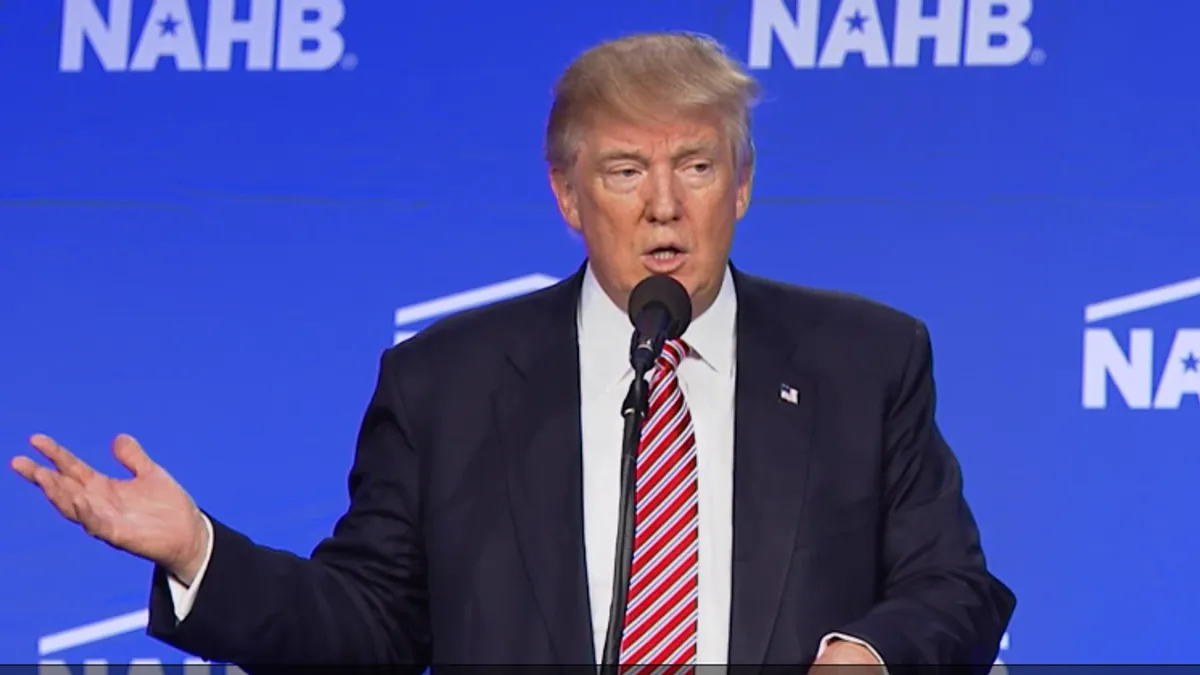Dive Brief:
- A coalition of 12 construction industry and other private sector groups sent a letter Tuesday to President-elect Donald Trump and requested that he rescind President Barack Obama's Executive Order 13502, which encourages federal agencies to require project labor agreements on large-scale projects.
- The groups — including the Associated Builders and Contractors, Associated General Contractors of America, National Association of Home Builders and the U.S. Chamber of Commerce, among others — wrote that PLAs force union control of all labor relations, often require nonunion employees to pay into benefit schemes on which they might never be able to collect, and do not represent the nearly 87% of the nation's nonunion construction workers.
- The coalition added that repeal of the federal PLA mandate would eliminate the 12%-18% in extra costs that these agreements trigger and would "create a level playing field" for both union and nonunion contractors.
Dive Insight:
PLAs have been a divisive issue in the construction industry, as opponents, such as the ABC, claim that PLAs restrict competition and raise costs, particularly because a common requirement of PLAs mandates that contractors and employees must pay into union benefit plans and abide by union work rules. However, proponents of PLAs claim they are a way of controlling costs and quality on the job, and they reject the idea that they place an undue burden on nonunion contractors and employees.
The full argument against PLAs is included in the AGC's regulatory plan, "Make Federal Agencies Responsible Again," which lays out its framework for the incoming administration to use as a guide in determining which federal regulations help or hurt private industry. The AGC said that businesses paid almost $1.9 trillion in regulatory compliance costs in 2015 and more than $800 billion in regulatory costs themselves since 2008. In addition, the association said infrastructure projects are held back by bureaucratic red tape an average of six years.
Along with PLAs, the AGC suggested that Trump also address such regulations as the Fair Pay and Safe Workplaces Executive Order, the Occupational Safety and Health Administration's revised silica rule, the anti-retaliation portion of OSHA's new electronic recordkeeping rule, the Environmental Protection Agency's "Waters of the United States" regulation and the Department of Labor's revised overtime rule and its proposed exemption threshold.
The industry has pushed back against these and other federal regulations, the most recent of which is the doubling of the salary level at which employees become exempt from overtime pay laws. The revised rule raised that threshold from $23,600 ($455 per week) to $47,476 ($913 per week), a move that left construction industry employers worried about extra costs and the possibility of having to rework their internal wage and management structures.
Industry groups, including the AGC, sued the DOL over the changes, and a U.S. District Court judge in Texas issued a nationwide injunction against the rule in November, ruling that the updated regulation established a "de facto salary-only test" in determining whether an employee should be paid overtime and at what pay level.













